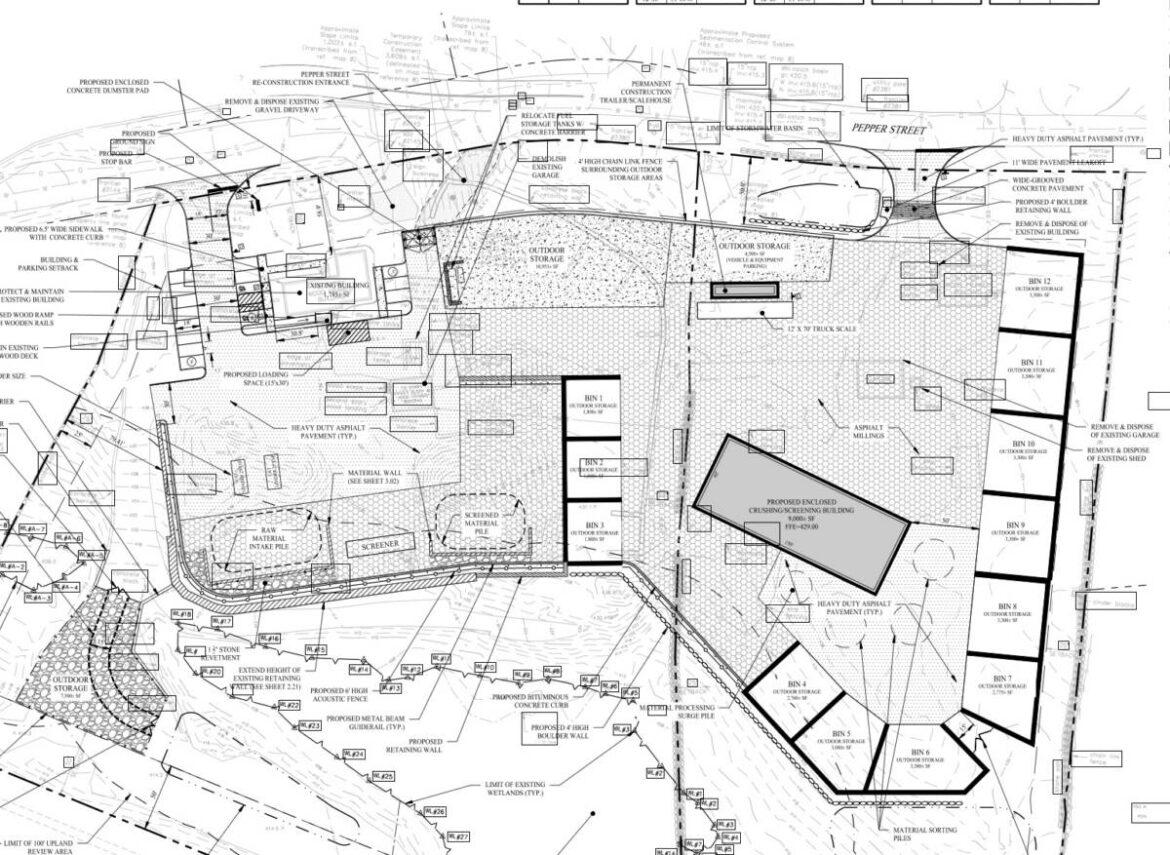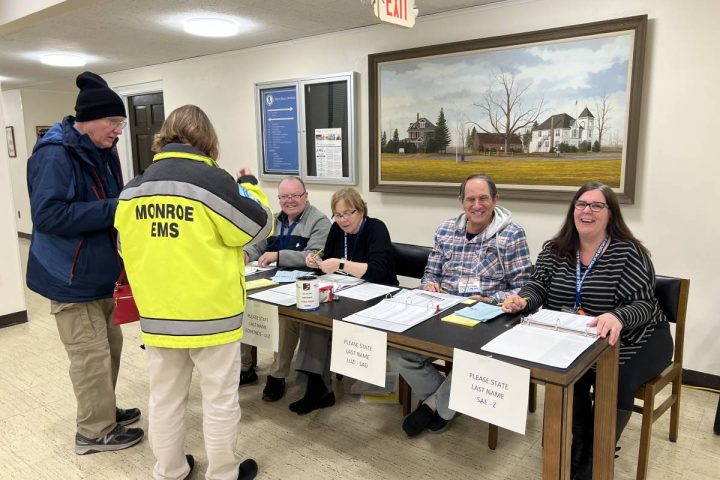MONROE, CT — A developer seeking a special exception permit to build a 9,000-square-foot manufacturing facility at 467 and 485 Pepper St. revised his plan to move all crushing indoors.
The business will be called Monroe Recycling and Aggregates LLC. Joe Grasso, owner of The Grasso Companies LLC, will make a product there called reclaimed asphalt, a road base approved by the state of Connecticut. In the manufacturing process, old asphalt chunks are ground up.
Outside the building processed materials would be placed in finished product bins and sold.
The initial plan for a smaller, 4,000-square-foot processing facility at 485 Pepper St., had been approved by the Planning and Zoning Commission in 2018, mainly because the crushing operation would be entirely indoors.
Several commissioners had questioned the current proposal for the expanded operation, because one screener was outside.
“We understand the comments and concerns,” Kevin Solli, principal of Solli Engineering, which is representing the applicant, said at last Thursday’s hearing.
“In order to satisfy the commission,” he said Grasso is reverting back to the plan that was previously approved, including the equipment list.
Leon Ambrosey, a commissioner, pointed out that the building would increase in size with the latest application. “So basically it’s a totally different application,” he said. “You increased the storage and the size of the building.”
Solli agreed that the building is larger to accommodate the operation. He said the main change was the addition of 467 Pepper St.
“There were concerns over the screener,” Chris Pawlowski, a civil engineer with Solli Engineering, said. “We moved it inside the building. There will be two screeners inside, none outside — no crushing outside.”
Pawlowski also said they significantly cut down on the equipment on the site, because several commissioners said they thought it was too much.
The plan received an approval from the Inland Wetlands Commission and the Planning and Zoning Commission is expected to deliberate on it on Feb. 16.
If the application is approved, Pawlowski said his client will provide periodic reports to the commission with manifests of where material brought to the site came from for the life of the operation.
Insulated for sound
“I’m wondering if the building will dampen the sound enough,” said Dominic Smeraglino III, a commission alternate.
“The town of Monroe has a noise ordinance,” Solli said. “It has requirements. The applicant will have to meet those regulations. This is far more restrictive than DEEP requirements.”
“The building is insulated for sound,” Pawlowski added. “It’s not just a steel building.”
Ambrosey asked if ground water monitoring wells are on the property. “It’s close to the Pequonnock River and you’re going to be bringing in asphalt,” he said. “Did wetlands have any concern over that?”
Solli said no and Pawlowski explained how various stormwater measures are in place to ensure pollution does not go into the wetlands. Solli said monitoring wells are installed if there are areas of concern or known contaminants.
“You’re bringing in asphalt and concrete from roads and you don’t know how old some of the roads are,” Ambrosey said, adding there could be PCBs.
“No, we don’t see any real cause for concern for any contamination,” Solli said. “We’re not looking to create massive piles of asphalt and leave it there for a long time.”
Ambrosey said concrete with rebar in it is not considered to be clean fill and Solli said there is testing and his client would not accept concrete with rebar, adding this will not be a recycling facility.
Site monitoring
Solli said soil drains will be in the building, which will also have dust suppression sprinklers. Any material on the ground would be swept up and put back in the base material, he said.
He said there would be routine inspections and scheduled cleaning of sediment, keeping it off the roads.
Vice Chairman Bruno Maini noted how hard monitoring a site can be.
“We technically will never know,” he said of the activity. Once the commission sees something on a report, Maini said the material would already be processed and gone.
All respectful comments with the commenter’s first and last name are welcome.







The so-called manufacturing facility proposed by the Grasso Company LLC to be called Monroe Recycling and Aggregates LLC is being characterized as a manufacturing process in order to get around Monroe’s “no-recycling” ordinance. However, you cannot change the character of a recycling business by merely calling it something else. The business as currently proposed will take reclaimed asphalt to be used as a road base by grinding up old asphalt chunks which is the very definition of recycling not manufacturing.
“Remanufacturing preserves the entire form of a product, whereas recycling involves breaking the product down into its component parts and melting, smelting or reprocessing them into new forms.”
Asphalt Pavement Recycling:
“According to the Asphalt Pavement Alliance, reclaimed asphalt pavement (RAP) can be recycled into pavement that is as high, or even higher, in quality as pavements made from all-virgin materials. In addition, the same material can be recycled again and again without losing its value. The asphalt cement, the glue that holds the pavement together, retains its ability to function as glue or cement, so that it is reused for its original purpose. The aggregates (rocks, sand, and gravel) in the original pavement are also conserved. It is estimated that the recycling of asphalt pavement saves American taxpayers more than $2.5 billion per year. It also saves thousands of acre-feet of landfill space each year. Materials from other industries are routinely recycled into asphalt pavements instead of going into landfills. Some of the most common are rubber from used tires, asphalt roofing shingles, and steel and blast furnace slags. Besides being used directly in new asphalt, RAP has been used as road base products, often mixed with concrete.”
If it walks like a duck…